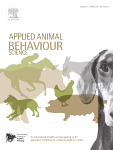Document type : Scientific article published in Applied Animal Behaviour Science
Author: Stephanie Megan Plato
Preview: Limited evidence supports the hypothesised link between Obsessive-Compulsive and Related Disorders (OCRD) and Equine Stereotypical Behaviours (ESB), despite the existence of many non-human animal OCRD models. ESBs are viewed as aversive behaviours or 'stable vices' by the general horse owning population, in stark contrast to the psychological disorders OCRDs are known to be. BSEs have been linked to intensive domestication and sub-optimal living conditions and current BSE management strategies are known to be more harmful than relieving. An anonymous three-round Delphi study was conducted with the expertise of five panellists heavily involved in the fields of human, horse and other animal behaviour, welfare and medicine to gain perspective of the extent of similarities and differences between OCRD and ESB. The main elements considered are neurology and neurological dysfunction, causal factors, aetiology, behavioural presentations, effects on welfare and the potential benefits and harms of recognising BSE as a manifestation of OCRD. Round One consisted of a series of open-ended questions to gather common themes on which to base the Round Two Likert-style scale questions and further open-ended questions, the answers to which formed statements used in Round Three. The panellists were asked to specify reasons for agreement or disagreement directed towards reaching consensus. Qualitative analysis was used throughout including open coding in Rounds One and Two. An tentative consensus was reached in that all panellists agree that OCRD and ESB are comparable conditions which share some causal factors, e.g. neurotransmitter pathway and signalling dysfunctions, stress in early life and genetic predispositions. However, there was some dispute over the cognitive underpinnings leading to hesitations surrounding the nature, or even existence of, obsessive thoughts and therefore the neurobiological causes of compulsive behaviours in horses. It was noted that the vastly different lifestyles of humans and husbandry of horses play an important role in the nature and presentations of OCRD and BSE, and most agreed that diagnosing BSE as a non-human presentation of OCRD would be beneficial to increasing owner and carer awareness of the importance of high welfare standards. However, this was not deemed to be essential, whereas improving knowledge available to owners and carers was.




